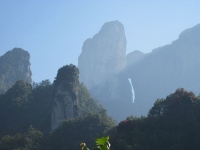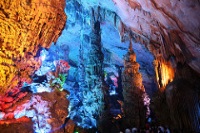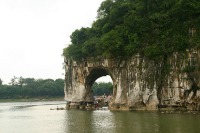Guilin Travel Guide
Guilin is a small riverside city in southern China, and has long been one of the county's most tranquil and picturesque locales. Its name means 'Sweet Osmanthus', courtesy of the area's many sweet-smelling Osmanthus trees. The region's distinctive limestone karst hills provide a dramatic backdrop for the city, making it a favourite destination of poets, artists and photographers throughout the centuries.
The hills are believed to have been formed in tectonic shifts millions of years ago. Limestone sediments thrust up from the sea forming the unusual hills, caves and stone forests that characterise the city.
Guilin's two major lakes are Banyan Lake (Rong Hu) and Cedar Lake (Shan Hu). They offer scenic boat trips to view the hills, along with bridges, pagodas and ancient banyan trees, while also being connected via waterways to other lakes in Guilin. Another popular boat tour travels along the Li River to the town of Yangshuo, where visitors can spend a day exploring the mountainous city.
As Guilin is a tourist-oriented city, all the necessary amenities for travellers are available, including comprehensive public transport, plenty of restaurants and lots of souvenir shops. The city is popular with Chinese tourists too because of its clean air and splendid scenery.
Things to do in Guilin
This relatively small city is best known for its clear air and picturesque scenery. Most activities revolve around the caves, mountains, rock formations, rivers, lakes, and gardens that make Guilin a photographer's paradise.
Boat rides and cruises are a popular way to navigate scenic areas such as Elephant Trunk Hill (Xiangbishan), which is one of Guilin's most iconic sights. This large natural arch sits on the Li River's banks and resembles an elephant bending down to drink. Like most places of interest in this tourist-orientated city, Elephant Trunk Hill is situated in a park that boasts numerous other attractions and amusements. Guilin is also famous for its caves and impressive rock formations. Visitors should try the Reed Flute Cave for a great hour-long tour through some of the area's most intriguing caves.
If travellers are willing to go further afield, the Tianmen Mountain National Park is about a four-hour drive from Guilin. Tianmen is one of the most impressive scenic areas in China and boasts multiple attractions. From Zhangjiajie city at the base of the mountain, visitors can take one of the world's longest cableways up the peak. Once there, they can explore many trails, temples, and walkways, including the thrilling Walk of Faith: a transparent glass pavement built on the side of the mountain.
Seven Star Park gives visitors a taste of everything Guilin is famous for. Among other things, it features a zoo with Giant Pandas and tigers, extensive gardens, caves, the famous Flower Bridge and Camel Hill. Art lovers will enjoy the Guilin Art Park and the Guilin Arts Museum.
For shopping, browsing, and eating out, travellers can head to West Street (also aptly called Guilin Foreigner Street) for numerous restaurants, shops, stalls, and cafes. This is a colourful, vibrant, friendly and multicultural area.

Tianmen Mountain National Park
A trip to Tianmen Mountain Park is an ideal weekend excursion from Guilin, boasting some of the most beautiful and most photographed landscapes in China. The city of Zhangjiajie nestles within the famous mountain park, from where visitors can take one of the world's longest scenic cableways up into the mountains.
Tianmen Cave, a massive archway created by an ancient cliff collapse, is known as Heaven's Gate because it resembles a doorway into another world. Travellers have to climb 999 steps to reach this natural phenomenon, but it is well worth the effort and is said to bring happiness and health, the number 999 being a lucky number in Chinese culture.
Other attractions in the park include various scenic areas, some impressive temples and the terrifying Walk of Faith, a walkway constructed of glass so that, as visitors edge along it, they can see the ground 4,690 feet (1,430m) below. The transparent pavement is a uniquely thrilling sightseeing experience, with those who brave it rewarded by truly heart-stopping scenery. The mountains can get cold, so the best time to visit Tianmen is during summer and autumn (May to October).

Reed Flute Cave
The limestone formations of Reed Flute Cave resemble everything from lions and monkeys to the skyline of Guilin itself, each with a name and story. Myths and atmospheric lighting add to its mystery and magic, with guides pointing out main attractions and ancient inscriptions dating back to the Tang dynasty more than 1,200 years ago. Unfortunately, photography is not allowed inside the cave, and visitors should be prepared to wait for more people if they are in a group of less than 20. The cave is situated in a park with ponds, bridges and pavilions; a beautiful place in which to relax and wander either before or after the tour. For those travelling near Guilin with children, this is a wonderful attraction for the whole family.

Elephant Trunk Hill
Elephant Trunk Hill on the banks of the Li River has a large natural arch, faintly resembling an elephant drinking water. This natural limestone monument rises over 180 feet (55m) above the water. The opening of the arch is called Water Moon Cave as the reflection of the moon at night appears as though it is both in and out of the water. Inside this cave there are more than 50 inscriptions dating back to the Tang Dynasty (618-907).
Visitors can explore the hill and the cave by hiring one of the traditional bamboo rafts that paddle around the base. At the top of the hill is a two-story pagoda built during the Ming dynasty (1368-1644), intended to resemble a vase on the elephant's back when viewed from afar. The hill is part of a beautiful park with lovely lush hills, winding paths and a number of sculptures, many of which are elephant themed. Dusk is possibly the best time to visit, as this is when the scenery is at its most dramatic.
Getting Around
Guilin has buses that run throughout the city, with certain routes created for tourists travelling to popular sightseeing spots. Taxis are also readily available and can either be hailed in the street or called in advance. Travellers should ensure that drivers use the taxi's meter and should also have their destination written in Chinese, since few drivers speak English.
Cycling is a popular way of getting around, and many cafes and hotels offer bicycles for hire. There are two main stations for rail transport, linking the city centre with the rest of the country through the Hunan-Guangxi Railway. Aside from ground travel, there are also two docks that facilitate tours down the Li River to Yangshuo.
Guilin Climate and Weather
Its warm-temperate humid climate means that Guilin has hot, muggy summers and short mild winters. The hottest period of the year lasts from June until the end of September, with daily highs above 92F (33C) and frequent thunderstorms, especially in June and July. The cold season lasts between mid-December and mid-February. Daily high temperatures in winter tend to stay below 59F (15C) but rarely drop below 39F (4C). Cloud cover becomes more likely as winter progresses, with overcast weather most frequent in February and mid-March. Light to moderate rain becomes more frequent as winter switches over to spring, with thunderstorms increasingly common from March onwards.
China travel info
Electricity
Electrical current is 220 volts, 50Hz. Plug types vary, but the two-pin flat blade and oblique three-pin flat blade plugs are common. Adapters are generally required.
Language
The official language is Mandarin Chinese, but there are hundreds of local dialects.
Money
China's currency is the Renminbi Yuan (CNY), which is divided into 10 jiao or 100 fen. Cashless payments via smartphone applications such as WeChat Pay are increasingly commonplace in main cities, and major credit cards are widely accepted. ATMs are widely available in major cities. It is not possible to exchange Scottish or Northern Irish bank notes; banks are closed on weekends.
Tipping
Tipping is not officially recognised in China, though the practice is has become increasingly common among tour guides, top-end restaurants, tour bus drivers and hotel staff. Travellers wanting to tip should leave a gratuity of about 10 percent. Large hotels and restaurants often include a service charge in their bills, usually of around 10 percent, so travellers should make sure that they aren't doubling up.
Health
A yellow fever vaccination certificate is required from travellers coming into China from infected where there is a risk of transmission. There is a risk of malaria throughout the low-lying areas of the country, and it is recommended that travellers to China seek medical advice about malaria before departure. All eligible travellers should be up to date with their COVID-19 vaccines; vaccinations are recommended against hepatitis A and hepatitis B, typhoid (not necessary if eating and drinking in major restaurants and hotels), Japanese encephalitis (usually only recommended for rural areas), and rabies (only recommended for travellers at risk of animal bites). Tap water shouldn't be drunk unless it has first been boiled, filtered or chemically disinfected. Street food should be treated with caution. High levels of air pollution in major cities and industrialised areas in China may exacerbate bronchial, sinus or asthma conditions. There is generally a high standard of health care in major Chinese cities, but it is not provided free of charge; travellers are advised to have comprehensive travel health insurance.
Safety
China is one of the safety countries to visit in Asia. Serious crime against foreigners is rare but does occur, particularly in isolated or sparsely populated areas. If travelling alone, including following parts of the Great Wall, it is advisable to leave an itinerary and expected time of return with a third party. Travellers should take extra care in street markets and at tourist sites, which attract thieves and pickpockets, and around the popular expat bar areas at night, where lone foreigners have occasionally been targetted. Travellers should be cautious about using pedicabs in Beijing, as tourists have reportedly been mugged by the drivers. Disputes over taxi fares can occur. Passengers should insist on paying the metered fare and should ask for a receipt; this has the taxi number on it.
Seasonal heavy rains and typhoons cause hundreds of deaths in China each year, particularly those areas bordering the Yangtze River in central, southern and western China. Demonstrations have taken place in Lhasa, Tibet, as well as in some Chinese provinces in protest against Chinese rule in Tibet. Even though the situation seems to have stabilised, visitors are advised to stay up to date on the situation before travelling to the region and to avoid all protests. The Chinese government sometimes suspends the issue of permits for travel to Tibet due to unrest.
There is currently little threat from global terrorism. The risk of terror attacks is higher in the Xinjiang Uyghur Autonomous Region and travellers should exercise caution if travelling to or around Xinjiang.
Local customs
Chinese people usually have three names, the first of which is their surname, or family name. As a result, visitors should be prepared for hotels mistakenly reserving rooms under their first names. For clarity, surnames may be underlined. When addressing Chinese people, the surname should come first and official titles should be used. Chinese handshakes last longer than those in western countries, and it is customary to stand close together when in conversation. Politeness in western terms is often foreign to the Chinese, and they rarely bother with pleasantries. It is considered disrespectful to keep prolonged eye contact, avoiding eye contact is considered reverential rather than rude. All foreigners should carry their ID on them at all times, as spot checks are common. Failure to show evidence of ID when requested by an official may result in a fine or detention.
Doing business
The Chinese are strict timekeepers and being late for a meeting is considered rude. When meeting people for the first time it is normal to shake hands and say 'ni hao', which means 'how are you'. Handshakes generally go on for longer in China than in most western countries. Business cards are commonly exchanged at the start of meetings in China; it is customary to have one side printed in Chinese and one in English. When giving or receiving business cards or a gift, it is customary to hold it with both hands. Chinese consider gifts an important show of courtesy. Decision-making may take longer than expected during negotiations. During a meal or reception, a host is likely to offer a toast; foreigners may be expected to offer them one in return.
Women are generally treated with respect and courtesy when doing business in China and it is increasingly common to find Chinese women in senior positions, especially in the big cities. Businesswomen should, however, avoid showing too much skin. Business dress for both men and women tends to be conservative and plain without much ornament or bright colour.
Business hours are 8am to 5pm, Monday to Saturday. A five-day week is more common in larger cities and international companies. Workers usually take their lunch break between 12pm and 2pm and it is not unusual to find offices empty during this time.
Duty free
Travellers to China do not need to pay customs duty on 400 cigarettes or 100 cigars or 500g of tobacco; 1.5 litres of alcohol; perfume for personal use; and personal articles up to the value of CNY2000. Prohibited goods include arms, ammunition, or printed material that conflicts with the public order or moral standards of the country. Also prohibited are radio transmitters and receivers, exposed but undeveloped film and fresh produce. Strict regulations apply to the import and export of antiquities, banned publications, and religious literature. All valuables must be declared on the forms provided.
Communications
The international dialling code for China is +86. Hotels, cafes and restaurants offering free WiFi are widely available. As international roaming costs can be high, purchasing a local prepaid SIM card can be a cheaper option.
Passport & Visa
There are a few complex exceptions to Chinese visa requirements, which will not apply to the majority of visitors, but all requirements should be confirmed with a Chinese embassy before travel. All documents necessary for further travel and sufficient funds to cover intended period of stay are required; travel to Tibet will require a special Tibet Entry Permit. It's recommended that passports be valid for six months after intended period of travel.
Entry requirements
US nationals require a passport that is valid for six months after the date of departure. A visa is required for entry into China.
UK nationals require a passport that is valid on arrival for six months after the date of departure. UK Emergency Travel Documents (ETDs) are accepted for entry, airside transit and exit from China. Travellers may need to show a police report indicating how they lost your full passport. A visa is required for entry.
Canadians require a passport that is valid for six months at the time of entry. A visa is also required.
Australians require a passport valid on arrival, and a visa for entry to China. A valid visa is required.
South African nationals require a passport valid on arrival, and a visa for entry to China.
Irish nationals require a passport valid on arrival, and a visa for entry to China.
New Zealand nationals require a passport valid on arrival, and a visa for entry to China.
Useful contacts
Ministry of Culture and Tourism, Guangxi: +86 773 288 5326, www.topchinatravel.com/
110 (Police); 120 (Ambulance)Embassies / consulates in other countries
Chinese Embassy, Washington DC, United States: +1 202 495 2266.
Chinese Embassy, London, United Kingdom: +44 (0)20 7299 4049.
Chinese Embassy, Ottawa, Canada: +1 613 789 3434.
Chinese Embassy, Canberra, Australia: +61 (0)2 6228 3999.
Chinese Embassy, Pretoria, South Africa: +27 (0)12 431 6500.
Chinese Embassy, Dublin, Ireland: +353 (0)1 219 6651.
Chinese Embassy, Wellington, New Zealand: +64 (0)4 473 3514.
Embassies / consulates in China
United States Embassy, Beijing: +86 (0)10 8531 3000.
British Embassy, Beijing: +86 (0)10 5192 4000.
Canadian Embassy, Beijing: +86 (0)10 5139 4000.
Australian Embassy, Beijing: +86 (0)10 5140 4111.
South African Embassy, Beijing: +86 (0)10 8532 0000.
Irish Embassy, Beijing: +86 (0)10 8531 6200.
New Zealand Embassy, Beijing: +86 (0)10 8531 2700.



